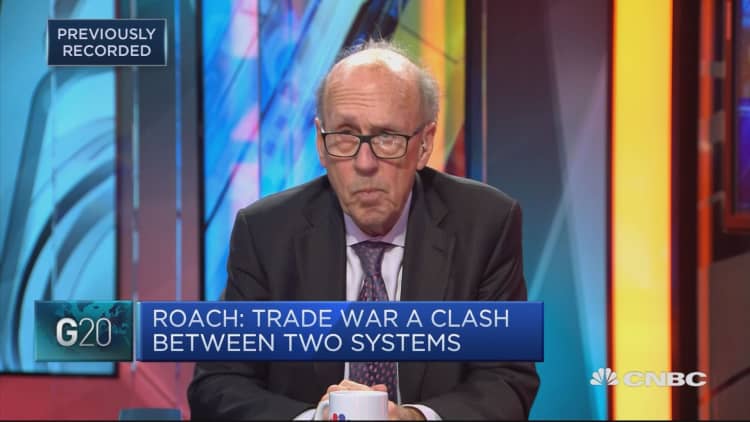
The U.S. and China could be in the early stages of a Cold War, veteran economist Stephen Roach told CNBC Friday, warning the global trade dispute is likely last for a "long, long time."
His comments come ahead of a high-stakes meeting between President Donald Trump and Chinese premier Xi Jinping this week, as world leaders gather at the G-20 summit in Argentina.
Simmering trade tensions between the world's two largest economies are expected to dominate the summit's agenda, with financial markets closely monitoring the prospect of a potential breakthrough.
"I think the end game is that this is a clash between two systems. And the U.S. is objecting to a state-sponsored 'market-based socialist system' that uses the largess of the state to subsidize industrial policy," Roach, senior fellow at Yale University and former chairman of Morgan Stanley Asia, told CNBC's "Squawk Box Europe" Friday.
"Even though, America has had industrial policy for decades but implements it through the military industrial complex orchestrated by the Pentagon. Japan does it, Germany does it, we are making it sound like China is the only one that does it," he added.
Mixed signals
Trump initially triggered the trade conflict with Beijing earlier this year, accusing the Asian giant of "unfair" trade practices and intellectual property theft.
The U.S. has imposed a total of $250 billion worth of tariffs against Chinese goods since July, prompting China to retaliate with charges on $110 billion worth of U.S. products.
In October, Vice President Mike Pence said in a speech that China was guilty of "predatory" economic practices. He provided no evidence for his claims.
Pence also warned the U.S. could more than double the number of tariffs imposed against China over the coming months, saying the American people "deserved to know" Beijing had been orchestrating a campaign to undermine the Trump administration.
"What Mike Pence said is that these are going to be longstanding issues and that raises the possibility — echoed by a speech that (Former U.S. Treasury Secretary) Hank Paulson gave a couple of weeks ago — that we could be entering a Cold War with China that would last for a long, long time," Roach said Friday.
Earlier this month, the U.S. president suggested his administration could soon strike a deal with China. This elevated hopes among many investors that global trade tensions could soon be defused.
However, Trump appeared to pour cold water on the prospects of a trade deal this weekend, saying Thursday that while an agreement was close he was not sure whether he wanted one.


